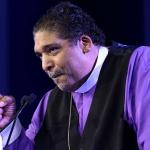Former Congresswoman Michele Bachmann, speaking at the recent Values Voter Summit, said this: “You know, the remarkable thing when you read the Bible, every archaeology find that has ever come forward has only proved the authenticity of the Bible.”
This is not true. Unlike most of the falsehoods Bachmann has parroted during her political career, she didn’t learn this one from Fox News or the right-wing fever swamp. This was a falsehood she learned in church.
I remember hearing this same claim many times in church and church settings — Christian school chapel services, Bible camp campfires, youth group retreats, etc. It was something recited to us and by us for the same reasons Bachmann recited it. This falsehood is a kind of self-directed lie — a lie intended to reassure oneself more than to deceive others. It’s a kind of protective incantation — something we could chant to stave off creeping doubt.
But it’s nonsense. “Every archaeology find … has only proved the authenticity of the Bible” makes no sense to anyone who knows anything about archaeology.* And it also makes no sense to anyone who has read the Bible with open eyes.
The “authenticity” Bachmann claims refers to a very specific set of ideas about the Bible. It’s the belief that the Bible is a unified, journalistic account of history, in which every detail of every story, poem, parable and legend is based on events that actually occurred precisely as written. And if you’ve read the Bible carefully, that raises the obvious question of which events. Is the “factual” history of 1 & 2 Kings literally true in every detail? Or is the “factual” history of 1 & 2 Chronicles literally true? Because it can’t be both.

Biblical scholars and honest biblical students recognize that the Bible includes multiple, conflicting accounts in its “histories.” This is something that even conservative evangelical biblical scholars recognize to be true (but, shhh, don’t tell anyone or you may get them in trouble). The literary “histories” of the Bible provide us with competing and conflicting facts, events and timelines — with irreconcilably different accounts of the same events.
And now, added to that mix, we have more than a century of painstaking archaeological study throughout Palestine and Egypt and all of the ancient lands of the Bible. What we’ve learned from that doesn’t settle the disputes between the conflicting biblical accounts, but instead introduces yet another variation of the narrative. This doesn’t mean that archaeological findings disprove the “authenticity” of the biblical narratives, but it does show that their authenticity involves something other than the kind of literal, factual, modern historical accounts that Bachmann et. al. want or need or expect to find in its pages.
For a glimpse of the kind of thing this means for honest biblical scholarship, let me recommend Philip Jenkins’ recent fascinating post at The Anxious Bench: “From Wessex to the Exodus.”
“As an undergraduate at Cambridge,” Jenkins writes, “my emphasis was in Anglo-Saxon, Norse and Celtic Studies, which amounted to a degree in Late Antique and Early Medieval history and culture.” Drawing on that background, Jenkins thinks “early medieval history can actually tell us something about Biblical events.”
Specifically, he thinks Cerdic can teach us a thing or two about Moses.
Cerdic is, like Moses, an important figure in the history of a people and a nation who may or may not have actually existed. We know some things about this early Saxon king from ancient literature (a text called the Anglo-Saxon Chronicle). And we know some other things about him from the archaeological record. But those two sources do not seem to agree on some rather important details.
Jenkins discusses how historians attempt to understand that disparity, and he draws a compelling parallel between that idea and the way that a new book on the biblical Exodus attempts to learn from the archaeological record (or lack thereof) involving that event.
Undergirding all of this historical musing is something called the “documentary hypothesis.” That’s a long-standing, much-disputed theory — or category of theories — about the composition of the first five books of the Bible, i.e., the Pentateuch or the Torah, or the “books of Moses.” It attempts to identify and understand the different contributions that various ancient writers and editors made to these texts, in part by noting the different words for God employed in different places. We needn’t get into all the specifics of that here — there won’t be a quiz at the end of this post on the JEPD sources. The basic idea, though, is that these various writers were addressing different sets of concerns or interests,** and that they shaped their narratives (and the “facts” of those narratives) to reinforce those concerns.
Note how this changes our encounter with the various conflicts, tensions, and contradictions in the text as a whole. Rather than being a problem to be solved (or dismissed), these become an opportunity for greater understanding. The goal is not to force them into some awkward “harmonization,” nor is it to attempt to deduce which of these accounts is the most accurate portrayal of “what really happened” (that’s what archaeology is for). It is, instead, an attempt to understand their various perspectives and to use those multiple perspectives to provide a kind of parallax view that we cannot get from a single angle.
None of that matters to fundamentalists like Bachmann. They have no patience for or interest in any theories about the composition of the books of Moses. They already know who wrote them: Moses himself, taking dictation directly from God. And, in their view, any so-called “biblical scholar” who says otherwise is an apostate, someone who abandoned the true faith when they went off to their fancy universities and seminaries to hob-knob with intellectual elites. The wisdom of this world is foolishness with God, etc.
This fundamentalist view is also widespread, on a popular level, among many evangelicals who would never consider themselves to be fundamentalist. (It’s also widespread, on a popular level, among many mainline Protestants and Roman Catholics who would never consider themselves to be evangelical.)
Which brings us back to the “faculty lounge.” Jenkins’ post is right there on Patheos’ “evangelical channel.” For his intended audience — educated evangelical academics and clergy — nothing he says will be construed as “controversial” or as evidence of apostasy. They already know and accept what he knows and accepts — that archaeology offers scant support for anything like a “literal” Exodus, and that something like the documentary hypothesis is necessary to understand the diversity of conflicting perspectives within the Bible itself.
Within the evangelical faculty lounge, this is all simply known. Outside of the faculty lounge, though, in the pews and amongst the donors, such ideas are not simply unknown, but perceived as threatening. We know that Moses didn’t write Deuteronomy, but we also know that saying so, in the wrong setting, can wind up getting us in hot water.
(I hope I’m not getting Philip Jenkins into hot water by drawing attention to his delightfully insightful discussion, but he teaches at Baylor and not, say, Biola, so probably not.)
– – – – – – – – – – – –
* The claim is particularly absurd for people like Bachmann and the fundamentalist preachers I heard this from in my youth, because these folks are also young-Earth creationists. According to the not-at-all-literal “literalism” of the interpretive scheme they impose on the Bible, it “teaches” that the Earth and the human race and the entire universe is only about 6,000 to 10,000 years old. That claim cannot withstand even a glancing encounter with archaeology — which provides mountains of evidence for human cultures far, far older than that.
** It seems to help, somewhat, if we say “concerns and interests,” rather than “agendas,” because that term tends to make some folks get rather defensively hostile.

















